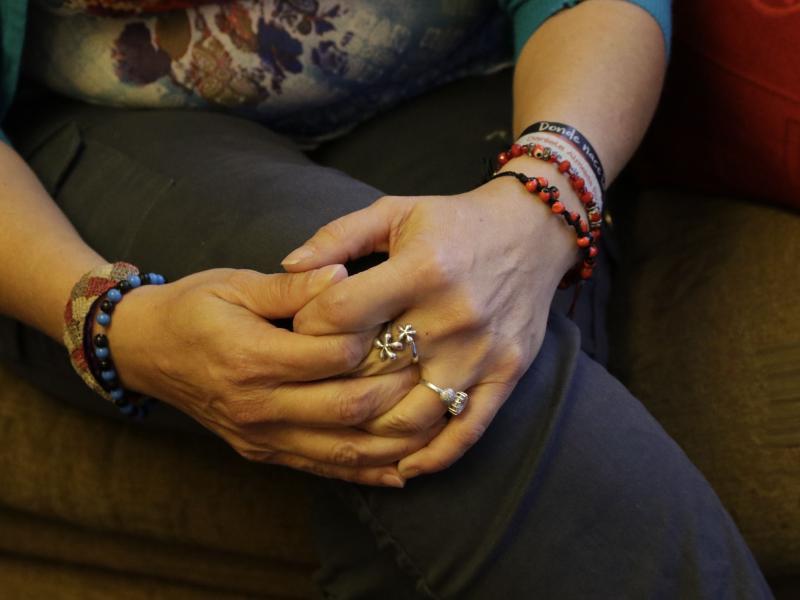27
03/2022
At 24 years old, Carolina López saw no other option than to move house, after months of being persecuted by her ex-partner, who could not accept that she had decided not to be with him.
Her breaking point was when in a conversation he told her: "I'm going to kill you." And despite the fact that she describes him as a liar and manipulator, since he was able to convince the guard to let him into her building despite the fact that there was an express order to the contrary, this time she believed him.
Narcisa: “I have felt myself dying, like many women”
Immediately, Carolina called five people (for security) and shortly after, she managed to prevent her aggressor from appearing again. She attributes this action to the "privilege" that she had to study anthropology and to have participated in activist groups since she was 15 years old. "Sexist violence is seen in attitudes that you can identify on a daily basis, from how your partner speaks to you to how you assume phrases like 'Oh, it's that you provoke'", she explains.
However, for María Fernanda López, doctor in Theories of Culture, this supposed privilege does not prevent any woman from suffering episodes of violence. “The issue of privileges is a stigma. I have a doctorate and even so I have suffered sexist violence. I had to 'funar' my ex-partner who harassed my daughter during the pandemic."
The professional points out that violence occurs at different social levels, even at the highest, "where children also suffer abuse." And she holds the entire society responsible for the violent behaviors that men and women develop. López maintains that children "are everyone's children", because they are formed in the world from interactions with the rest.

Her version coincides with the most recent figures (as of 2019) from the National Institute of Statistics and Censuses (INEC), which reflect a difference of 3 points in the percentage of women who experience violence in rural or urban areas.
In the case of ethnic origin, there is a variation that does not exceed six percentage points. Afro-descendants are the women who experience the most violence with 71.8%, while 58.4% of the montuvias said they had experienced aggression.
The settings in which women experience violence are also varied. Alejandra had one of the most promising prospects in her company. Her boss had told her that after a year of work they would review her salary and that there would surely be a raise for her. Three months before the deadline, she informed the company that she was pregnant, but when the year was up, her superior told her: “Now you are going to have a much more valuable and representative activity, which is being a mother.” remember her. Her salary review will have to wait until after the breastfeeding period, that is, another 12 months.
And it is that 20.1% of women have experienced violence in the workplace, either because they earn about 100 dollars less on average than men, or because they must experience embarrassing situations, such as when a co-worker told Ericka Sánchez "let yourself go" (a phrase used as a form of interaction with sexual intentions) in her company's cafeteria, or when she took a nap in the company transport and woke up when one of her colleagues caressed her and then came on. "I don't even remember what I said to him because of the shock it caused me."
Other aspects such as educational or family violence occur "because these women cannot go out on the streets because they are taking care of children, because women are still relegated to the private space," López argues.
For Carolina, violence has no face or specific context, but it happens, and the best thing is to know what to do. She agrees with the expert that the solution lies in a comprehensive education that can distance new generations from gender violence and provide both men and women with the tools to identify violent behavior in time.
EU and UN promote gender violence prevention campaign in Ecuador

- 821
- Does it match the clothes on the app?
Related Articles
The scanner of... Pilar Rubio: we get the truth (and what they don't want to be known) from celebrities
02/02/2022The halo of mystery that surrounds celebrities is always part of their charm, and it is that we never know where they are going to turn out, if they really tell us the truth or if they are people like us when...
30 Best Men's High Neck Sweater for you
24/02/2022Home » Clothing » 30 Best Men's Turtleneck Sweater for youClothesJenaro CardoApril 25, 2021 178 Views0SaveSavedRemoved 0 Improving technology only needs to increase the level of competition in ca...
50 Best Bedspreads 135 in 2021 - Based on 996 Customer Reviews and 66 Hours of Testing
18/04/2022Yes, Reig Martí Blue QUILT Bedspread for Bed 135 cm VASSILE is one of the most sought-after bedspreads for beds 135, it does not satisfy everyone's needs and it can be a bit expensive. That's why, after passing 66...
30 Top Rated 18th Birthday Balloons
11/05/2022Home » Office Products » 30 Top Rated 18th Birthday Balloons Office Products Gervasio Teodoro January 25, 2022 36 Views0 SaveSavedRemoved 0 Are you wandering around the market to...